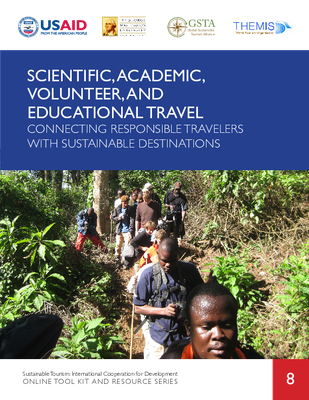ST8. Scientific, Academic, Volunteer, And Educational Travel - Connecting Responsible Travelers With Sustainable Destinations
This toolkit will describe the steps necessary for designing a SAVE travel and tourism development strategy. It provides guidance for the development of a SAVE center, an entity with a mission to enable the destination to create travel and tourism products that service the SAVE travel market and to link those products to their respective markets. Most of all, the guidebook seeks to provide practical tools, including assessment surveys, that can aid in the development process. This manual is from a set of nine courses on Sustainable Tourism that have been developed by George Washington University as a result of compiling the lessons and best practices from the USAID Global Sustainable Tourism Alliance (GSTA) program, and other tourism development experiences. The courses train students, practitioners, donor agency representatives, and others working in related fields to understand and develop tourism and its role in international development. All the course materials are public access and also can be found inside the USAID NRM&D Learning Management Center. Your registration in these courses will allow you to actively participate in discussions of the material, and to take quizzes to check yourself for understanding at the end of each course. Each of the nine courses are offered free on a non-academic credit basis and offer a Certificate of Completion from USAID. Participants may take these courses to build your own knowledge of the field of tourism and development. The target audience for this manual, Scientific, Academic, Volunteer, And Educational Travel - Connecting Responsible Travelers With Sustainable Destinations, includes professionals working on tourism-related projects in developing countries, including staff from donor and government agencies, non-governmental organizations, consulting firms, universities, businesses, and other entities.
https://biodiversitylinks.org/projects/completed-projects/gsta/scientific-academic-volunteer-and-educational-travel-connecting-responsible-travelers-with-sustainable-destinations/view
https://biodiversitylinks.org/projects/completed-projects/gsta/scientific-academic-volunteer-and-educational-travel-connecting-responsible-travelers-with-sustainable-destinations/@@download/image/image.png
File
ST8. Scientific, Academic, Volunteer, And Educational Travel - Connecting Responsible Travelers With Sustainable Destinations
Author(s):
Kristin Lamoureux,
Donald Leadbetter,
Roberta Hilbruner,
Donald E. Hawkins
Publication Date: 2011
DOWNLOAD FILE
This toolkit will describe the steps necessary for designing a SAVE travel and tourism development strategy. It provides guidance for the development of a SAVE center, an entity with a mission to enable the destination to create travel and tourism products that service the SAVE travel market and to link those products to their respective markets. Most of all, the guidebook seeks to provide practical tools, including assessment surveys, that can aid in the development process. This manual is from a set of nine courses on Sustainable Tourism that have been developed by George Washington University as a result of compiling the lessons and best practices from the USAID Global Sustainable Tourism Alliance (GSTA) program, and other tourism development experiences. The courses train students, practitioners, donor agency representatives, and others working in related fields to understand and develop tourism and its role in international development. All the course materials are public access and also can be found inside the USAID NRM&D Learning Management Center. Your registration in these courses will allow you to actively participate in discussions of the material, and to take quizzes to check yourself for understanding at the end of each course. Each of the nine courses are offered free on a non-academic credit basis and offer a Certificate of Completion from USAID. Participants may take these courses to build your own knowledge of the field of tourism and development. The target audience for this manual, Scientific, Academic, Volunteer, And Educational Travel - Connecting Responsible Travelers With Sustainable Destinations, includes professionals working on tourism-related projects in developing countries, including staff from donor and government agencies, non-governmental organizations, consulting firms, universities, businesses, and other entities.



